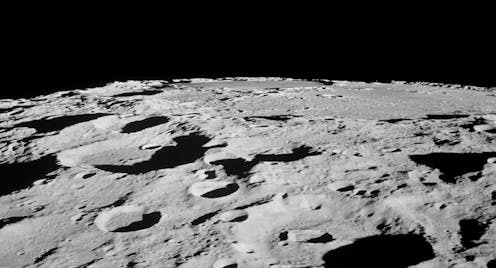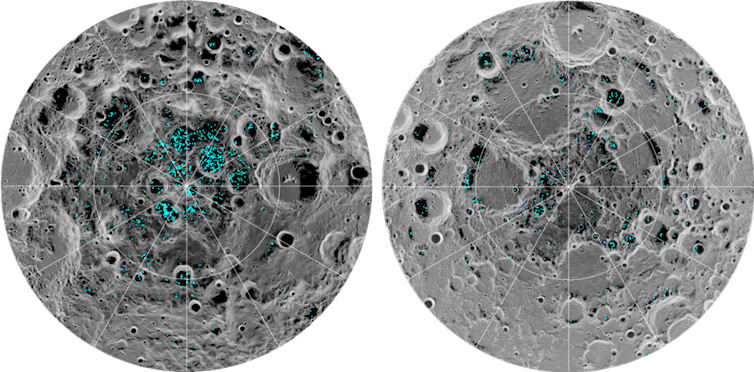Back to the Moon: A space lawyer and planetary scientist on what it will take to share the benefits
A US-led coalition and China are both planning to establish bases on the Moon. How the two nations will navigate actions on the Moon and how other countries will be involved is still unclear.

NASA is planning to put U.S. astronauts back on the surface of the Moon by the end of 2024. This mission is just the beginning of what is shaping up to be a historic few decades in space exploration, as both the U.S. and China have plans to establish a permanent human presence on the Moon.
The first question you might have is: Why now?
The short answer is the relatively recent discovery of water on the Moon. But the deeper and perhaps more important questions have to do with how competing space agencies will pull off this feat given the limited resources on Earth’s satellite.
In this episode of The Conversation Weekly, we speak with two people – a planetary scientist who studies the geology of the Moon, and a space lawyer who studies space policy and geopolitics – about the challenges facing nations as humanity looks to set up shop on the Moon.
When Apollo astronauts brought back the first lunar rocks in the late 1960s and early 1970s, scientists were disappointed to find no sign of water or anything of much use in the samples. The Moon looked to be a barren place.
Fast forward a few decades and two coinciding events reshaped the future of the Moon – the sudden boom in the private space sector and the discovery of water frozen in permanently shadowed craters on the Moon’s surface. All of a sudden, setting up a base on the Moon was not only desirable, but feasible, too.

“If you want to explore space with humans, water becomes one of the most critical commodities,” explains Mahesh Anand, a professor of planetary science and exploration at the Open University in the U.K. “We need water to survive, but water can also be split into its individual components, like oxygen, which we need to breathe.” But there are many other resources on the Moon, and as Anand explains, “Water is where the story begins, but it doesn’t end there. Utilizing resources in situ – where you are – that’s what is actually opening up the field of lunar exploration.”
The U.S. Artemis program, which had its first launch in 2022, is the beginning of a plan to eventually build a base on the surface of the Moon as well as a space station in orbit around it. The U.S. and its collaborators are not alone in these lunar ambitions – China, too, has plans to establish a permanent presence on the Moon before 2030. And both groups explicitly plan to use lunar resources to accomplish these goals.
How this all works legally is an open question that is being debated right now in international venues like the United Nations, but there are some agreements on the books already.
“It’s fun to think about space as being the Wild West with no rules. But it’s not. We do have the Outer Space Treaty,” explains Michelle Hanlon, a law professor at the University of Mississippi in the U.S. This treaty has been signed by most countries and lays out an almost utopian framework for how nations are supposed to act in space. “The main provisions of the Outer Space Treaty say that space is for everybody,” Hanlon continues. “Nobody can claim any territory in space, it’s free for exploration and use by all, and the Moon and all of the celestial bodies shall be used exclusively for peaceful purposes.”
The high-minded ideals of space law are quickly heading toward a collision with the reality of humanity expanding off Earth – and bringing all of our geopolitics and competing interests with us. Listen to the full episode to learn how nations are navigating the big scientific, legal and moral questions of a lunar future.
This episode was hosted by Dan Merino, written by Katie Flood and co-produced by Dan Merino and Katie Flood. The executive producer is Mend Mariwany. Eloise Stevens does our sound design, and our theme music is by Neeta Sarl.
You can find us on Twitter @TC_Audio, on Instagram at theconversationdotcom or via email. You can also subscribe to The Conversation’s free daily email here. A transcript of this episode will be available soon.
Listen to “The Conversation Weekly” via any of the apps listed above, download it directly via our RSS feed or find out how else to listen here.
Michelle L.D. Hanlon does not work for, consult, own shares in or receive funding from any company or organization that would benefit from this article, and has disclosed no relevant affiliations beyond their academic appointment.
Mahesh Anand receives funding from the UK Science and Technology Facilities Council (STFC), UK Space Agency (UKSA), and the European Space Agency (ESA). He is also a member of the ESA’s Prospect Science Team and of the UKSA’s Space Exploration Advisory Committee.
Read These Next
How the polar vortex and warm ocean are intensifying a major US winter storm
The atmosphere is a complicated place. Warm temperatures in one spot can contribute to brutally cold…
‘We want you arrested because we said so’ – how ICE’s policy on raiding whatever homes it wants viol
Since the republic’s beginning, it has been uncontested law that to invade someone’s home, the government…
Your brain can be trained, much like your muscles – a neurologist explains how to boost your brain h
Challenging the brain by exposing it to new situations, tasks and skills can improve its efficiency,…





